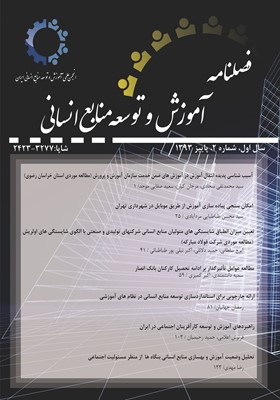آسیبشناسی پدیده انتقال آموزش در آموزشهای ضمنخدمت سازمان آموزش و پرورش (مطالعه موردی استان خراسان رضوی)
محورهای موضوعی :سید محمدتقی سجادی 1 , مرجان کیان 2
1 -
2 -
کلید واژه: انتقال آموزش دوره های آموزشی ضمنخدمت معلمان آموزش و پرورش پژوهش كيفي ,
چکیده مقاله :
پژوهش حاضر با هدف آسیبشناسی پدیده انتقال آموزش در آموزشهای ضمنخدمت سازمان آموزش و پرورش آغاز شد که بدین منظور ابتدا به شناسایی دورههای آموزشی ضمنخدمت دچار شکست انتقال آموزش پرداخته شد در مرحله دوم به بررسی علل و پیامدهای این امر، و در مرحله سوم به طراحی مدل توجیهی این فرایند اقدام گردید. در مرحله پایانی نیز به منظور اعتباربخشی نظریه پایانی از معیارهای تناسب (بازنگری توسط شرکت کنندگان)، جامعیت (بازنگری توسط شرکتکنندگان)، قابلیت فهم (طراحی مدل و بازبینی توسط متخصصان و شرکتکنندگان)، شفافیت (توضیح روندکار) استفاده شد. رویکرد پژوهش حاضر از نوع کیفی و روش نظریه مبنایی بود که محیط پژوهش (جامعه) شامل تمامی معلمان با سابقه در زمینه حضور در دورههای آموزشی ضمنخدمت بود. اطلاعرسانها (نمونه) نیز شامل 23 نفر از معلمان استان خراسان رضوی بودکه براساس روش نمونهگیری هدفمند و قاعده اشباع نظری انتخاب شدند. ابزار پژوهش، مصاحبههای عمیق نیمهساختارمند و روش تجزیه و تحلیل دادهها، روش پیشنهادی استراس و کوربین بود. نتایج حاوی دو پدیده محوری "انتقال آموزش" و "یادگیری" بود که متأثر از عوامل زمینهای مؤثر یادگیری (یادگیرنده، آموزشدهنده، محتوا، امکانات و تجهیزات آموزشی، زمان و مکان آموزش، ارزشیابی و بازخورد) بودند. این دو پدیده شامل پیامدهای نیز بودند که به دو دسته پیامد برای معلمان (دید منفی و بیانگیزگی نسبت به سایر ضمن خدمتها، اتلاف وقت، کاهش سطح و کیفیت تدریس) و پیامد برای دانشآموزان (بینظمی و شلوغی در کلاس، بهرهمندی از روشهای کلیشهای و تکراری، عدم بهرهمندی از مطالب روز، دلمردگی و روزمرگی) تقسیم شدند.
The purpose of this study is to investigate the transfer of learning in the in-service training courses of Education Department. Thus, the study went on to identify those training courses which failed, how this failure took place and what repercussions occurred and then to design the process of the justification model. Participants of this study consisted of those teachers who had participated in development courses. These participants were 23 teachers from Khorasan Razavi Province, selected purposefully on the basis of data saturation. This study was conducted within qualitative approach using grounded theory method. In order to gather the sine quo non data, semi-structured interviews were used. Afterwards, the interviews were recorded and transcribed. To analyze the gathered narrative data, Strauss and Corbin's method came to help. Consequently, two core phenomena, namely Learning and Learning Transfer emerged which emanated from contextual conditions such as learners, trainers, content, facilities and equipment, time and space, evaluation and feedback. These two phenomena culminated in outcomes which can be categorized as "consequences for Teachers" (such as negative attitude towards training, wastage of time, lack of quality teaching) and "Consequences for Students" (such as disorder and congestion, facing the same old stereotypical methods, lack of updated knowledge, apathy and monotony). At the end, to validate the emerged paradigm, the following criteria were applied: appropriateness (member check), comprehensiveness (member check), understanding (external audit and member check), and clarity (process description).


